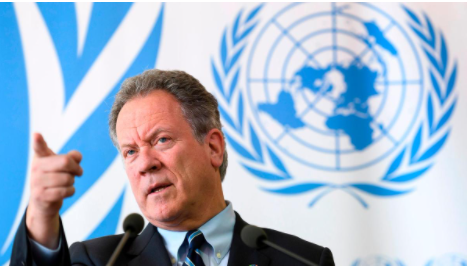Organisation’s hands-on chief reveals scale of world hunger problem in series of tweets
The World Food Programme (WFP) has won the 2020 Nobel Peace Prize.
The United Nations organisation, the 101st winner of the prestigious award, was praised for its efforts in tackling global hunger.
Presenting the award, the Nobel Committee urged the world to pay attention to the suffering of the hungry.
What is the WFP and what do they do?
Accepting the Peace Prize, WFP chief David Beasley said the award belonged to the “family” of aid workers on the front line.
Last year, the UN organisation helped 97 million people, distributing 15 billion rations across 88 countries.
It prides itself on being “the leading humanitarian organisation” in a world where, by its own estimates, some 690 million people – one in 11 – go to bed on an empty stomach.
Mr Beasley said: “They are out there in the most difficult, complex places in the world.
“Whether it’s war, conflict, climate extremes, it doesn’t matter. They are out there and they deserve this award.”
A glimpse of the globe-trotting aid chief’s Twitter feed demonstrates the scale of the global food crisis.
Mr Beasley uses a series of personal videos – shot in obscure locations including a locust swarm in Africa and the site of the Beirut blast – to highlight how quickly the WFP can respond.
At the devastated Port of Beirut, the South Carolina-born official tells his followers “we’re all hands on deck” distributing supplies after the explosion wiped out most of Lebanon’s grain reserves.
The hands-on former Republican governor earlier shot a video of himself at the back of a cargo jet delivering supplies to the stricken city, telling viewers: “You are literally looking at a catastrophe right now.”
“You’re not gonna catch us sleeping,” he says in the video.
On any given day, the WFP has 5,600 trucks, 30 ships and nearly 100 planes on the move.
The outlook for the world has grown even bleaker this year due to the pandemic, which has led to earnings losses, made food more expensive and disrupted supply chains.
Another risk to food supplies is the locust plague in eastern Africa, which Mr Beasley points out can eat away at crops designed to feed thousands:
The WFP said a quarter of the world’s population does not have reliable access to safe and nutritious food.
In Africa, nearly half the population faces shortages.
A WFP spokesman said their workers “go to remote areas sometimes risking their lives” to fill the breach.
He added: “It’s not office work, it’s on the ground, concretely.”
They provide emergency relief, cash and in-kind assistance and “resilience building” operations which aim to shore up food supplies.
The organisation is entirely funded by volunteer contributions – governments make up the vast bulk of the yearly budget.
The US, Germany and the UK were the three biggest donors in 2019.
The UAE was the sixth-biggest donor, contributing more than $272 million last year.
In June, Mr Beasley thanked the UAE from the back of a C17 jet:
The organisation said conflict, climate shocks and coronavirus were “emptying bowls faster than we can fill them.”
“Everything is at stake but month by month it’s all hands on deck. It’s not Chicken Licken here saying the sky is falling – it really is falling,” Mr Beasley


